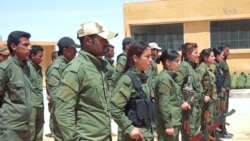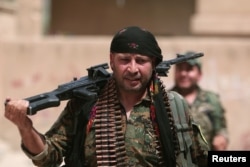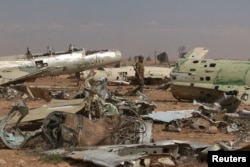U.S.-backed Syrian Democratic Forces (SDF) are speeding up training in preparation for a looming battle on Islamic State's capital, Raqqa, commanders told VOA.
Without giving a timetable, they said about 50,000 fighters would be participating in the battle for the IS stronghold, with aerial support from the U.S.-led coalition.
"Special experts from coalition countries are supporting the training with clothes, weapons and other equipment," Muhammad Fathi, an SDF commander, told VOA.
The SDF is a loosely knit alliance of Kurdish and Arab fighters that the U.S. sees as the most effective and reliable Syrian group fighting IS. The SDF has been closing in on Raqqa since November in a multiphased operation aimed at first isolating the city and then invading it. It recently claimed a major victory by seizing Syria's largest dam and Tabqa town, 50 kilometers west of Raqqa.
Driving IS from Raqqa is a major priority for the U.S.-led coalition. The U.S. announced this month that it would provide Kurdish forces around Raqqa with small arms, machine guns, ammunition and armored vehicles to counter improvised explosive devices and construction equipment. Washington sees arming the Kurdish fighters as the easiest way to bring about Raqqa's downfall.
U.S. President Donald Trump has ordered an "accelerated operation" against Islamic State jihadists in Syria, Secretary of Defense Jim Mattis said last week. Mattis called it a "tactical shift," saying the military would move away from operations designed to shove IS fighters out of seized locations, and instead focus on "surrounding the enemy in its stronghold."
Law and order
Kurdish commanders told VOA that hundreds of fighters were enrolled in seven-day training courses that would prepare them not only for the invasion but also to maintain law and order in Raqqa after IS. The training sites are in several locations in northern Syria, they said.
"Our goal has not been only to train fighters on how to take on the enemy, but also how to maintain stability in Raqqa," Fathi said.
A VOA Kurdish service reporter visited one of the training sites this week in a schoolyard in the town of Ain Issa, 50 kilometers north of Raqqa, where 50 young men and women finished a training program that Kurdish commanders said was supervised by the U.S.-led coalition. The graduates were dressed in green uniforms and wore light blue arm patches bearing the image of an eagle with its wings spread and emblazoned with the words "Raqqa Internal Security Force."
American military supervisors in the camp declined to comment.
But analysts and Kurdish activists in northern Syria say Syrian forces need training on how to use the U.S.-supplied weapons.
"The weapons are loaded on trucks and enter Rojava via the Iraqi Kurdistan's border on a daily basis," Jack Shahine, a Kurdish activist from northern Syria who monitors forces in the area, told VOA.
Shahine said the weapons are taken to military bases in Minbaj, Kobani and the Hasakah region, where U.S. special forces are present as trainers.
Turkish media reported that approximately 100 trucks have crossed into Syria from northern Iraq since May 15 with U.S. weapons.
Ankara opposes Washington's alliance with Syrian Kurdish forces fighting Islamic State. Turkey contends the SDF's Syrian Kurdish militia, known as the YPG, is a terrorist group affiliated with the outlawed PKK — the Kurdistan Workers' Party, a separatist group that has been battling the Turkish state for many years.
Pentagon spokesman Eric Pahon told VOA that the U.S. government had yet to provide weapons to the YPG. He said the weapons would be delivered to the YPG as necessary to accomplish specific military objectives in Raqqa.
"We're not going to comment on every delivery, the contents of those deliveries or the locations of the equipment we're providing," Pahon said. To "the extent possible, we want to keep IS in the dark to increase our partners' chances of a swift military defeat."
Stepped-up roles
A senior Kurdish official who spoke to VOA on condition of anonymity said coalition countries — mainly the U.S., France and Britain — had stepped up their advisory roles to the group.
"The forces are equipped with newly provided advanced anti-tank missiles to destroy armored suicide vehicles," the official said. "The advanced anti-tank missiles are very new to our forces, and therefore more training is needed in that area."
Michael Rubin, a former Pentagon official and an analyst with the American Enterprise Institute, a Washington public policy research group, told VOA that IS would most likely pose stiff resistance in Raqqa.
"Anti-tank missiles and anti-armor missiles are the top of the wish list since Daesh [an IS acronym] was able to acquire tanks, Humvees and perhaps MRAPs when the Iraqi army collapsed," he told VOA, referring to a type of mine-resistant military vehicle.
VOA'S Mahmoud Bali contributed to this report from Syria; Pentagon correspondent Carla Babb contributed from Washington.








